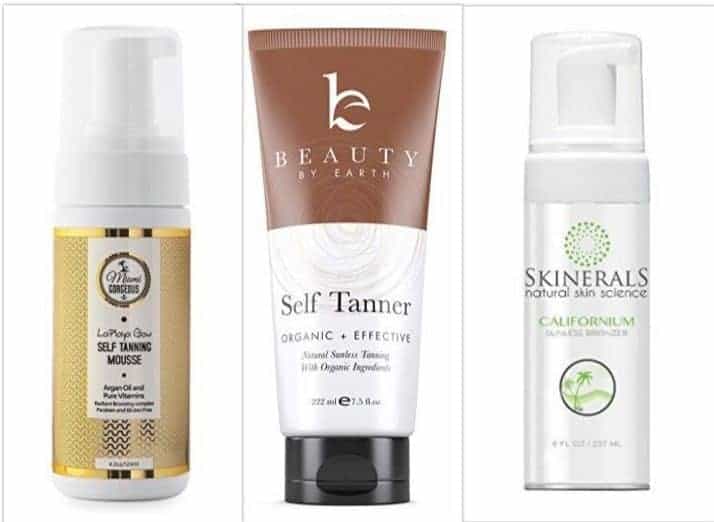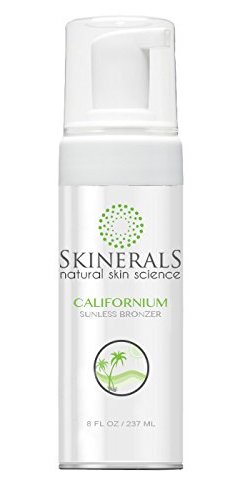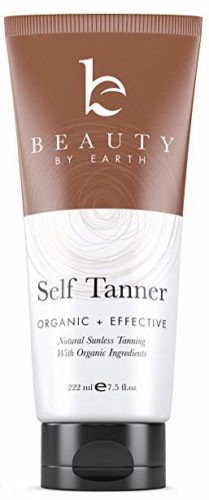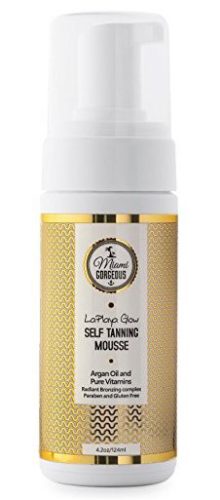3 Best Paraben-Free Self-Tanners
Self-tanning products gain popularity every year, and for good reason. Sunless tanners give you a beautiful glow, without exposing you to the harmful effects of UV rays.
What if we’re trading one danger for another by putting harmful chemicals on our skin?
There is a wide variety of qualities when it comes to fake tanning products, from cheap, toxic, synthetic self-tanners to organic, all-natural ones. One of the things that most people want is at least to have a paraben-free fake tanning product.
In this article, we’ll talk about the three best paraben-free self-tanners on the market.
Beyond that, though, we’ll discuss why many experts consider parabens dangerous and why we don’t want them in our beauty products.
We’ll also go over common questions and concerns.
Let’s start by talking about the best products for you.
3 Best Paraben-Free Fake Tanners
When I make a guide like this, listing what I think are the best of a certain product, there are a few things I want you to know.
When I first set out to find self-tanners, I was kind of lost with how many products there were. Was it right for my skin?

Would it give me a good tan? Was it easy to apply? So many other questions would run through my mind.
So in these guides, I want to try and do that work for you.
I spend many hours researching products, reviewing what I’ve tried, and condensing that information into a short and easy-to-navigate list. I use tons of criteria for my ranking, including:
- Price
- Quality
- Customer Reviews
- Pureness of Ingredients
- Is it completely paraben free
- Ease of application
And so much more…
Ok, enough wasting your time, let’s get to those products!
1. Skinerals Organic Self Tanner Sunless Californium Bronzer
You’ve probably seen this pop up in a few of my other “best of” lists, in fact, I wrote a full review for the product.
Skinerals has been making high-quality, completely natural self-tanners for quite a while and has built up an enormous following of people who absolutely love their products.
They pride themselves on never using chemicals and instead opting for natural ingredients and minerals. They still have DHA in their products, but as we’ve talked about before, DHA is a sugar that can be entirely natural and organic.
Instead of synthetically creating DHA as some products do, it can be harvested organically from sugar beets or cane sugar to the same effect.
This self-tanner from Skinerals is paraben-free, so you don’t need to worry about that at all. In fact, it’s completely free of any dangerous chemicals, vegan, cruelty-free, and gluten-free.
All of their products are made in the USA, and each comes with a specific serial number so that you know you’re getting the real thing.
As far as the quality of the self-tanner goes, this stuff is amazing.
It is one of the best-reviewed self-tanners on Amazon because it produces an absolutely beautiful bronze glow without subjecting your skin to harsh, drying chemicals.
If you haven’t tried an organic or all-natural self-tanner, I would encourage you to start with this one!
2. Beauty By Earth Organic Sunless Tanner
First of all, this product is 100% organic and all natural. In fact, let’s take a look at the ingredients:
Water, Organic Aloe Vera Leaf Juice, Organic Shea Butter, Cetyl Alcohol, Stearyl Alcohol, Organic Coconut Seed Oil, Dihydroxyacetone (DHA), Glycerin (Vegetable), Organic Japanese Green Tea Leaf Extract, Organic Pomegranate Extract, Organic Witch Hazel Extract, Organic Cranberry Fruit Extract, Organic Jojoba Seed Oil, Organic Argan Oil, Potassium Sorbate.
If you look through those, I hope you notice that they do not contain parabens or other chemical preservatives.
Just like the previous one, and just about all self-tanners, there is DHA in this product.
It is completely organic and naturally derived from sugar cane or sugar beets, so don’t worry.
This self-tanner works for any skin color and produces a beautiful tan without even a hint of orange.
It and many others on this list are also really great if you have sensitive skin or are worried about skin allergies from self-tanners.
Although this was really easy to apply, it worked best with a self-tanning mitt. It’s a very good value for the quality of self-tanner you get for the price, so I’d encourage you to give it a try!
3. Miami Gorgeous Organic Self-Tanning Mousse
Miami Gorgeous self-tanner is:
- Paraben-Free
- Sulfate-Free
- Cruelty-Free
- Gluten Free
- Streak-Free
- Has ECO-Certified DHA
- Completely Organic
- and Fast Drying
In addition to all these things that you should look for in a quality organic fake tanner, it also produces an absolutely beautiful tan (something you don’t always find).
You can use this product on your entire body and your face.
So if you’re looking for a paraben-free fake tanner that is easy to apply, safe and nourishing for your skin, and produces a beautiful all-over tan, give this one a try.
Alright, now that we’ve talked about the best paraben-free self-tanners, let’s talk a little bit about what parabens are, and why you should care.
What Are Parabens, And Are They Dangerous?
Parabens didn’t really start showing up in beauty products until the mid-1950s.
Although some people think that “paraben” is a single ingredient, it actually represents a whole group of synthetically produced chemical preservatives primarily used in beauty products.
Common parabens you’ll find on labels include:
- methylparaben
- ethylparaben
- propylparaben
- butylparaben
- isobutylparaben
So, if you see any of these on your ingredients list, that product is not paraben-free.
You’ll find ingredients like these in many products, including shampoo, moisturizer, deodorant, toothpaste, makeup, and many other beauty products.
Parabens are intended to prevent the growth of bacteria and fungi and preserve the product’s shelf life. Even if you avoid parabens in your beauty products, many grocery items also contain them.
Okay, so we know a little bit more about parabens now, but why should we be concerned?
The FDA has guidelines for safe limits of parabens in products. What worries health advocates and officials is the cumulative exposure to many products that contain parabens.
These parabens build up in our bloodstream and have been shown to contribute to a variety of health issues over time.
The largest risk from cumulative exposure is how parabens have been shown to affect hormone function. The Campaign for Safe Cosmetics (CSC) said this:
“Of greatest concern is that parabens are known to disrupt hormone function, an effect that is linked to increased risk of breast cancer and reproductive toxicity. Parabens mimic estrogen by binding to estrogen receptors on cells.”

In 2004, a British study was conducted on Parabens’ effects on women with breast cancer. They found traces of parabens in tumors for 19 out of the 20 women studied.
Citing this study, the CSC said the following:
“This small study does not prove a causal relationship between parabens and breast cancer, but it is important because it detected the presence of intact parabens—unaltered by the body’s metabolism—which is an indication of the chemical’s ability to penetrate the skin and remain in breast tissue.”
In 2012, the European Union banned the use of parabens in products sold there, and now, health advocates are fighting for a similar ban on products in the United States.
Health advocates are pressuring the FDA to ban parabens in products sold in the U.S.—like the European Union did in 2012—but concerned consumers must take matters into their own hands for now by reading product labels and avoiding products with parabens.
The CSC mentions that:
“Many natural and organic cosmetics manufacturers have found effective alternatives to parabens to prevent microbial growth in personal care products, Some companies have created preservative-free products that have shorter shelf lives than conventional products (six months to a year), but if used daily are likely to be used up before they expire.”
Final Thoughts
Ultimately, it’s up to you, the consumer, to decide if you’re concerned about parabens, but the research certainly suggests that you want to avoid them.
Considering that you can find just as high-quality self-tanners that don’t contain potentially dangerous chemicals.
I hope you enjoyed my list of the best paraben-free self-tanners. If you did, please consider sharing!
Related Articles
Is Self Tanner Bad For Your Skin?










